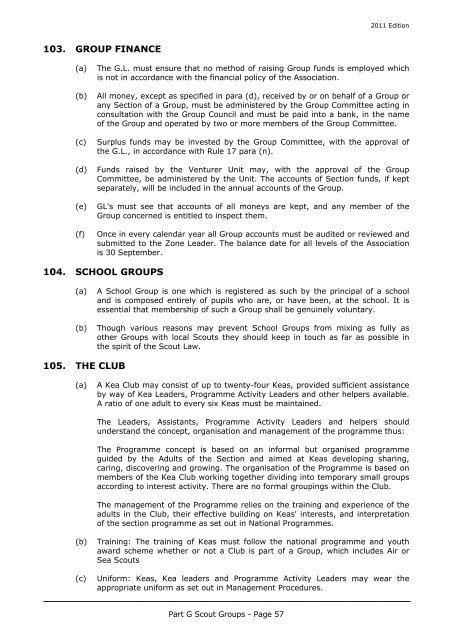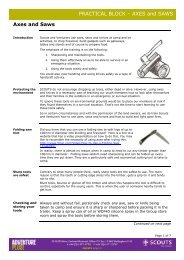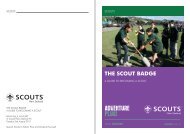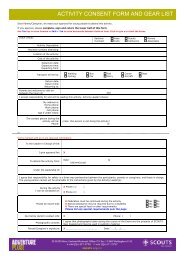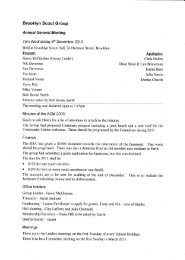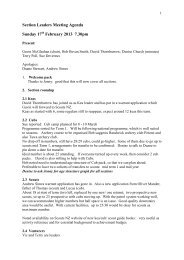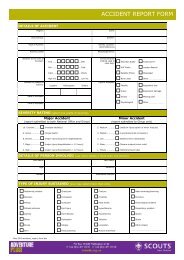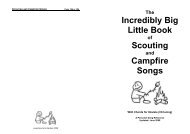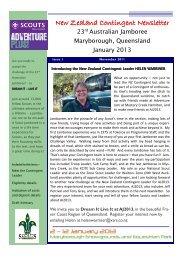The_Rule_Book - Brooklyn Scouts, Wellington
The_Rule_Book - Brooklyn Scouts, Wellington
The_Rule_Book - Brooklyn Scouts, Wellington
Create successful ePaper yourself
Turn your PDF publications into a flip-book with our unique Google optimized e-Paper software.
2011 Edition<br />
103. GROUP FINANCE<br />
(a)<br />
(b)<br />
(c)<br />
(d)<br />
(e)<br />
(f)<br />
<strong>The</strong> G.L. must ensure that no method of raising Group funds is employed which<br />
is not in accordance with the financial policy of the Association.<br />
All money, except as specified in para (d), received by or on behalf of a Group or<br />
any Section of a Group, must be administered by the Group Committee acting in<br />
consultation with the Group Council and must be paid into a bank, in the name<br />
of the Group and operated by two or more members of the Group Committee.<br />
Surplus funds may be invested by the Group Committee, with the approval of<br />
the G.L., in accordance with <strong>Rule</strong> 17 para (n).<br />
Funds raised by the Venturer Unit may, with the approval of the Group<br />
Committee, be administered by the Unit. <strong>The</strong> accounts of Section funds, if kept<br />
separately, will be included in the annual accounts of the Group.<br />
GL's must see that accounts of all moneys are kept, and any member of the<br />
Group concerned is entitled to inspect them.<br />
Once in every calendar year all Group accounts must be audited or reviewed and<br />
submitted to the Zone Leader. <strong>The</strong> balance date for all levels of the Association<br />
is 30 September.<br />
104. SCHOOL GROUPS<br />
(a)<br />
A School Group is one which is registered as such by the principal of a school<br />
and is composed entirely of pupils who are, or have been, at the school. It is<br />
essential that membership of such a Group shall be genuinely voluntary.<br />
(b) Though various reasons may prevent School Groups from mixing as fully as<br />
other Groups with local <strong>Scouts</strong> they should keep in touch as far as possible in<br />
the spirit of the Scout Law.<br />
105. THE CLUB<br />
(a)<br />
A Kea Club may consist of up to twenty-four Keas, provided sufficient assistance<br />
by way of Kea Leaders, Programme Activity Leaders and other helpers available.<br />
A ratio of one adult to every six Keas must be maintained.<br />
<strong>The</strong> Leaders, Assistants, Programme Activity Leaders and helpers should<br />
understand the concept, organisation and management of the programme thus:<br />
<strong>The</strong> Programme concept is based on an informal but organised programme<br />
guided by the Adults of the Section and aimed at Keas developing sharing,<br />
caring, discovering and growing. <strong>The</strong> organisation of the Programme is based on<br />
members of the Kea Club working together dividing into temporary small groups<br />
according to interest activity. <strong>The</strong>re are no formal groupings within the Club.<br />
<strong>The</strong> management of the Programme relies on the training and experience of the<br />
adults in the Club, their effective building on Keas' interests, and interpretation<br />
of the section programme as set out in National Programmes.<br />
(b)<br />
Training: <strong>The</strong> training of Keas must follow the national programme and youth<br />
award scheme whether or not a Club is part of a Group, which includes Air or<br />
Sea <strong>Scouts</strong><br />
(c) Uniform: Keas, Kea leaders and Programme Activity Leaders may wear the<br />
appropriate uniform as set out in Management Procedures.<br />
Part G Scout Groups - Page 57


